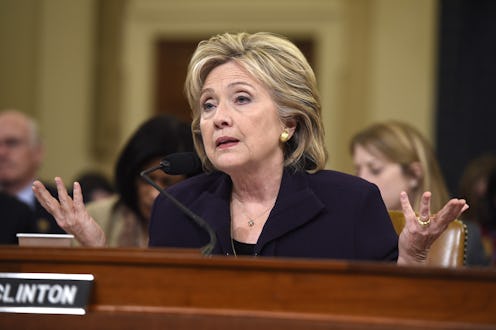News
'TIME' Short List Shows Tech Disrupted Politics
Donald Trump was just named TIME's vaunted "Person of the Year." In competition with him, TIME had narrowed down its shortlist of possibilities to another five contenders: Hillary Clinton; "The Hackers;" President of Turkey, Recep Tayyip Erdoan; the "CRISPR Pioneers;" and Beyoncé. Although these names might not immediately appear connected – comprised of political figures, scientists, an anonymous group of coding whizzes, and pop culture's biggest star – they are all united in one way. Each represents the titanic disruption of technology, for good and ill.
Take Clinton, and how her adherence to traditional political campaigning led to defeat. While Donald Trump thoughtlessly tweeted his "politically incorrect" musings at 3 a.m., Clinton kept to the script. She was relentlessly on message — voters found her practiced approach not as appealing as the countless real-time gaffes from Trump, any one of which would have ended the campaign of politicians in previous eras.
But Clinton's downfall was also the discovery of her private email server, and her inability to explain (and convince others) why she did not use a protected government address while employed as Secretary of State. When Colin Powell, also as Secretary of State, set up a private email for himself, few people cared. But in 2016, the risk of hacking is not some plot point from The Net, but an everyday threat, so people took Clinton's email server issues seriously.
Which brings us to the next group on TIME's list: "The Hackers." Without them, Americans may very well be looking at a President-elect Clinton. Because had the Democratic National Committee not had its email broken into, and had Clinton campaign manager, John Podesta, not seen his own emails also hacked and dumped online, the credibility of the Democratic party (and its candidate) would have been far less compromised. The one-sided nature of these hacks left Democrats reeling, while Republicans remained unscathed. As TIME put it, "They [the hackers] made vulnerability the new normal, and took aim at democracy itself." No future candidate or campaign can afford to communicate online without serious editing and censorship; all digital discussions are susceptible to the skilled hacker.
Now add in the power of social media, a tool used by Turkish President Recep Tayyip Erdogan during the attempted coup earlier this year. Though Erdogan's government had often used social media shutdowns to meet their censorship aims, Erdogan himself utilized the power of Twitter and FaceTime to whip up support when his military tried to overthrow him. And it worked: Erdogan's supporters turned out in large numbers, and the coup was crushed. Turkey learned the power of 21st Century connectivity to achieve political aims.
That technology is at the core of TIME's next runner-up is obvious. The "CRISPR Pioneers" are using manipulation of the genome to try and cure cancer. If that moonshot comes to success, it would be the ultimate game changer, wiping out one of the top ten leading causes of human fatality the world over. But it also forces new questions on the ethics of cherry-picking genes. Is it "right" to ensure a child will be tall, or mathematically brilliant? And what if altering genes became a state-sponsored activity? These are wholly new challenges facing ethicists and scientists alike, and will involve public policy makers as well.
TIME's final nominee for "Person of the Year" was Beyoncé, an artist who has been part of America's pop landscape for well over a decade now. With her release of the top charting single "Formation," Beyonce brought race back into the spotlight, signaling that the "beyond black" Beyoncé was, in fact, very much conscious of her racial identity. That is a rebuttal to all those who thought the 2008 election of a black president had moved the country to a post-racial era. And it brought a decidedly political angle to Beyoncé's performance repertoire.
Taken together, TIME's 2016 shortlist for "Person of the Year" reveals a world immersed in technological change, the reverberations of which are blasting shockwaves through the political realm. From hacked emails and destabilized democracy, to tweeting strongmen and genome manipulation, 2016 saw the rise of increasingly complicated relationships between the public and private tech lives of citizens, scientists, politicians, and artists alike.
